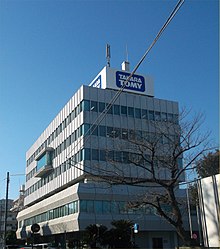 Former headquarters in Tokyo | |
Native name | 株式会社タカラ |
|---|---|
Romanized name | Kabushiki gaisha Takara |
| Founded | 1955 |
| Defunct | March 1, 2006 |
| Fate | Merged to Tomy |
| Successor | Takara Tomy |
| Headquarters | Tokyo, Japan |
| Products | BowLingual, Choro-Q, Microman, Transformers |
Takara Co., Ltd. (株式会社タカラ, Kabushiki gaisha Takara) was a Japanese toy company founded in 1955. In March 2006, the company merged with Tomy Company, Ltd. to form Takara Tomy. The Takara motto was「遊びは文化」("playing is culture").
In 1967, Takara produced the first generation of the Licca-chan doll, which was 21 centimeters tall and had the last name of Kayama, inspired by the musician Yuzo Kayama and actress Yoshiko Kayama.[1]
In 1975, Takara produced the Diaclone and Microman Micro Change toys. In 1984, the toy line was rebranded by Hasbro as "Transformers", which made Takara waste no time joining in. Takara continued to sell Microman and used it as the basis for the Micronauts toy line. Micronauts were sold internationally by the Mego Corporation. Other transforming toys made by Takara include Brave, Dennō Bōkenki Webdiver, and Daigunder. Both Webdiver and Daigunder toys could interact with TV screens, which proved only but a fad in the early 2000s.
Takara also invented Battle Beasts, the E-kara karaoke microphone, B-Daman and Beyblade. These toys were sold or distributed internationally by Hasbro.
In 1978, Takara developed the Choro-Q, mini pullback cars. Internationally, they have been sold as "Penny Racers".
|
See also: Category:Takara video games |
Takara developed and published video games. In the 1990s, Takara published the Chibi Maruko-chan video games. The company ported (adapted) some of the SNK Neo Geo based arcade games for 8 and 16-bit consoles. These included the Fatal Fury and the Samurai Shodown series. They were sold for use with the Sega Genesis, the Super Nintendo Entertainment System, the Game Boy, or the Famicom.
In 2003, Takara contributed to the production of the game, Seek-and-Destroy. Takara published the 3D computer graphics fighting game series Battle Arena Toshinden, developed by Tamsoft. Small games developers such as Tamsoft, BHE, E-game and KID corp, were sometimes omitted from the credits on a game's Takara packaging or title screens. Also that year, Takara purchased a controlling stake in the publicly traded software publisher Atlus. Some Takara properties were licensed to and published by Atlus.
In 2006, after the merger with Tomy, the controlling stake in Atlus was sold to Index Holdings, Takara Tomy's major shareholder. Takara-branded product licenses such as Licca-chan, Jinsei Game, The Game of Life and Choro-Q were returned to Takara Tomy's consumer software division. The merged company also produced the Zoids and the Naruto series.
Takara has manufactured several unusual gadgets marketed as "life entertainment products". An example is BowLingual which aimed to translate the sounds of dogs to human language. The BowLingual was named as one of the best inventions of 2002 by Time magazine.[2] See also Yumemi Kobo (dream generator).
In 2005, Takara produced Walkie bits, a colorful, multi-function miniature robotic turtle. it was named Time magazine's best invention in a robot category.[3]
In the 1980s, the company was criticized for using a mascot that was a golliwog-like character. The mascot was named "Dakko-Chan" (ダッコちゃん).[4] Takara replaced the mascot with "21st Century Colorful Dakko-Chan", which had enough features to connote the original mascot but divested the traits which brought criticism. For example, the new mascot was not always coloured black.
On 13 May 2005, Takara and Tomy announced their merger. It became effective on 1 March 2006. In English, the official name of the merged company is "TOMY Co. Ltd." while in Japan the legal company name is "K. K. Takara-Tomy" (株式会社タカラトミー; TYO: 7867).
In deciding upon the merged company's new name, "Takara" was used for its international brand recognition and "Tomy" was used because it was a trusted brand of infant and preschool products in Japan.
While Japanese commercial law allows wide latitude in translating Japanese corporate names into official English names, the merged company took the unusual step of adopting "TOMY Company, Ltd." as its official English, while using "K.K. Takara-Tomy" in Japan.
Both Takara and Tomy held licenses to localise and distribute Hasbro products in Japan. The products include The Game of Life, Blythe dolls, Magic: The Gathering, Duel Masters trading card games by Takara and Monopoly, Furby, Super Soaker and Play-Doh by Tomy.